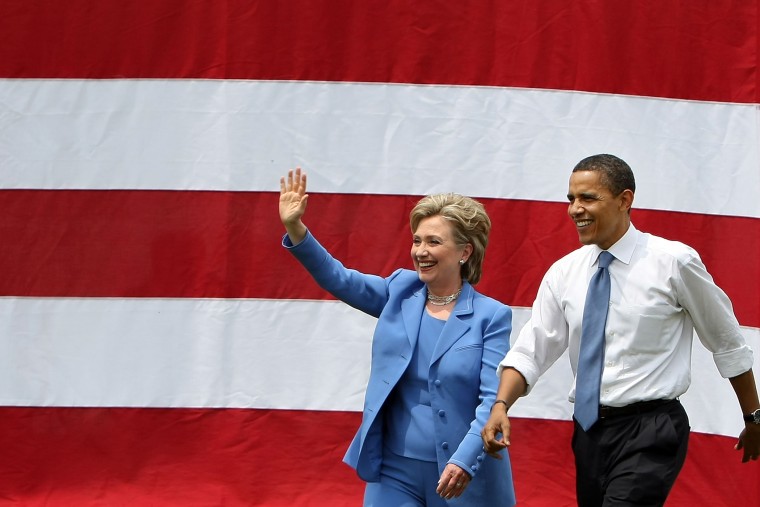Early on in last night's forum in Philadelphia, Rachel presented Hillary Clinton with the lay of the land in the Democratic presidential race, specifically as it relates to elusive party unity. Bernie Sanders, Rachel noted, "seems to be saying now that even if you beat him in the primary, it's not necessarily a given that he will implore all of his supporters to go out and work for you. He says that he thinks that they'll support you if basically you adopt some of his platform on the issues that are most important to him."
Asked if the senator's approach makes sense or if it's a bridge too far, Clinton noted her advantages -- more pledged delegates, more raw popular votes, etc. -- before pointing to what she sees as the ideal model.
"Let's look at what happened in 2008, because that's the closest example. Then-Senator Obama and I ran a really hard race. It was so much closer than the race right now between me and Senator Sanders. We had pretty much the same amount of popular votes. By some measures I had slightly more popular votes, he had slightly more pledged delegates. "We got to the end in June and I did not put down conditions. I didn't say, 'You know what, if Senator Obama does x, y and z, maybe I'll support him.' I said, 'I am supporting Senator Obama, because no matter what our differences might be, they pale in comparison to the differences between us and the Republicans.' That's what I did. "At that time 40 percent of my supporters said they would not support him. So from the time I withdrew, until the time I nominated him -- I nominated him at the [Democratic National Convention] in Denver -- I spent an enormous amount of time convincing my supporters to support him. And I'm happy to say the vast majority did. That is what I think one does. That is certainly what I did and I hope that we will see the same this year."
Clinton's version of events has the benefit of being true. By some measures, she fought longer than was absolutely necessary in 2008, and urged superdelegates to consider putting her over the top even after she came up short on pledged delegates, but after exhausting her alternatives, Clinton really did go all out for her Democratic rival.
Indeed, the
Washington Post's Greg Sargent
noted this morning that Team Obama was genuinely worried at the time that Clinton "might fail to deliver a full-throated call on her supporters to get behind him as the Democratic Party's standard bearer," but Clinton "put those doubts to rest for good when she delivered her still-remembered concession speech in June of 2008 endorsing Obama."
Greg
added, "Clinton not only endorsed Obama unequivocally and called on all her supporters to work 'as hard for Barack Obama as you have for me.' She also -- crucially -- made it absolutely clear that as hard fought as their disagreements during the primaries had been, in the general election, their broader values, political aspirations, and overarching goals for the future of the country had merged and were one and the same."
I spoke to a Democratic source this morning who also noted that, after conceding the race, Clinton attended 27 rallies in support of the Obama campaign, attended 11 fundraisers in support of her former rival, and delivered speeches on Obama's behalf to a variety of groups, including the American Nurses Association and NALEO (National Association of Latino Elected and Appointed Officials).
Barring an unexpected turn of events, Clinton will come out on top this year, and many in the party will turn to Sanders wondering whether he'll be as active a champion of the Democratic ticket in 2016 as Clinton was in 2008.
And at this point, we don't yet have a clear sense of the senator's plans. MSNBC's Alex Seitz-Wald
reported overnight:
Sanders [told Chris Hayes last night] he would do "everything in my power to make sure that no Republican gets into the White House," but apparently he doesn't see unifying the party as paramount to that goal. "This campaign is about taking on the entire establishment. The Democratic establishment, the financial establishment, and in Clinton's campaign, the most powerful political organization in the United States of America," Sanders said.
Of course, what candidates say and believe during a contentious primary process is likely to be different once the process ends. In this case, Sanders still hopes to do well in today's five primaries -- one of which he's favored to win -- and so it's probably unrealistic to think he's prepared to talk at length about his post-primary efforts on the part of his current rival.
The fact remains, however, that Clinton set a bar eight years ago when it comes to magnanimity in defeat, and she's likely to ask Sanders to match it. He has until mid-June to determine how best to meet that challenge.
